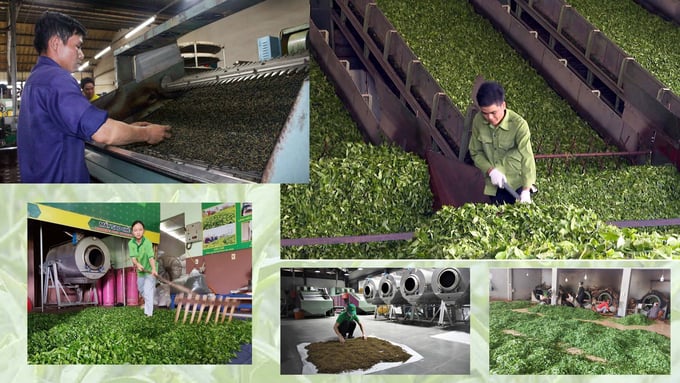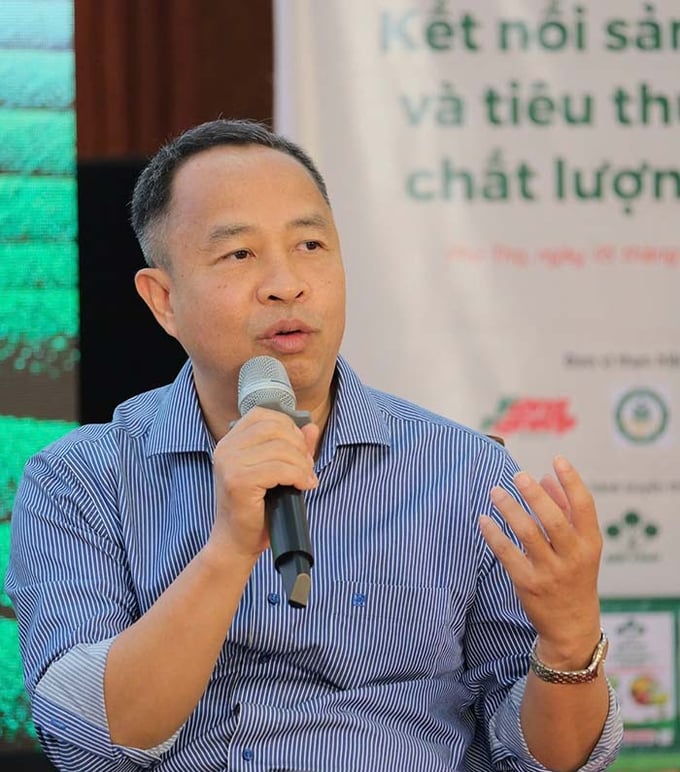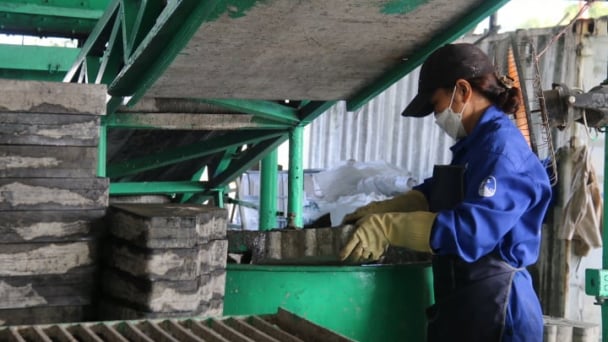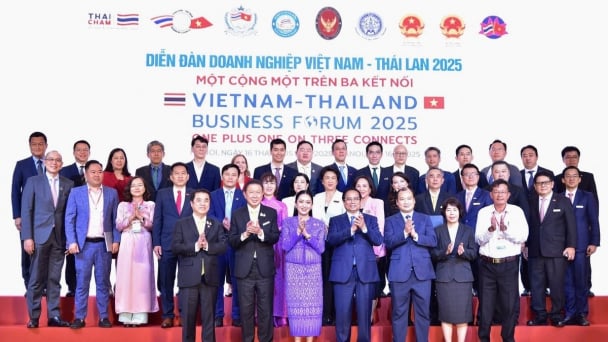May 19, 2025 | 15:52 GMT +7
May 19, 2025 | 15:52 GMT +7
Hotline: 0913.378.918
May 19, 2025 | 15:52 GMT +7
Hotline: 0913.378.918
To enhance product value, Vietnam's tea industry needs to make significant improvements in processing technology to meet the increasingly stringent standards of international markets and, at the same time, boost its competitiveness.
Currently, Vietnam ranks 5th in the world for tea exports, supplying products to over 100 countries. However, the export value of Vietnamese tea remains low, at only about 70% of the global average price. This is partly due to the relatively low processing quality and a heavy reliance on exporting raw tea.
One of the main reasons is that most tea processing facilities in Vietnam still rely on outdated technology, old equipment and manual processing methods. Currently, most of the exported tea products are limited to black and green tea, while the proportion of value-added products, such as tea bags, flavored teas, or specialty teas, remains very low in total export volume.

To increase competitiveness, the tea industry must improve the processing technology of exported tea.
According to Mr. Nguyen Van Toan, the former Director of the Northern Mountainous Agricultural and Forestry Science and Technology Institute, "If Vietnam continues to process tea using traditional, manual methods, it will be difficult to meet the requirements of high-end markets".
Moreover, the current tea production system lacks strong integration between the raw material-producing regions, farmers and businesses. This disconnection results in inconsistent product quality, making it difficult for Vietnamese tea to meet the stringent food safety standards set by international markets.
Modern technology plays a crucial role in minimizing pesticide residues and enhancing quality control, which helps ensure that Vietnamese tea meets stringent standards such as VietGAP, GlobalGAP and other international certifications.
Incorporating automation into key stages of the processing chain, such as tea roasting, drying and packaging, allows for precise control over temperature and processing times. This helps maintain consistent flavor and quality.
Furthermore, advanced processing technologies facilitate the creation of value-added tea products such as tea bags, flavored teas and premium types like Oolong tea. By producing these higher-value products, Vietnamese tea not only boosts its economic worth but also strengthens its brand and presence in international markets.

Mr. Doan Anh Tuan, Director of New Generation Co., Ltd.
At the forum "Connecting the production and consumption of high-quality tea", Mr. Doan Anh Tuan, Director of New Generation Co., Ltd., stated that, in the current stage, tea producers, processors and traders must undergo a shift in their thinking and approach.
As one of the largest tea exporters in the country, Mr. Tuan’s company is currently focusing on enhancing the added value of its products. This includes investing in state-of-the-art equipment and improving technology for the production of high-quality tea bags. They are committed to maintaining the highest production standards, particularly by ensuring that no unauthorized pesticides are used in the cultivation or processing of their tea.
Alongside this technological investment, Mr. Tuan plans to diversify and expand into eco-tourism products in tea-growing regions. He believes that Vietnam has many unique and special products, such as lotus-scented tea, which is delicately infused and offers a distinctive taste. These factors can bring these products to an international level, elevating them to the status of a national treasure with higher market value.
During the forum, experts, scientists and business owners were in agreement that the industry needs to equip tea processing plants with advanced, modern technology to automate key stages of production, from harvesting and tea roasting to packaging. It is crucial for tea factories to adopt integrated technologies that can control and optimize key factors such as temperature, processing time and humidity. These advancements will help improve the efficiency and consistency of the production process.
Biotechnology plays an essential role in the tea industry by enabling the selection and improvement of tea varieties, boosting the levels of polyphenols and amino acids, thereby enhancing the quality of the product. This advancement is a necessary step for Vietnam to strengthen its competitiveness and successfully compete with top tea-exporting countries such as China, India, and Sri Lanka.
In addition to technological improvements in cultivation, it is also crucial to establish strong, sustainable partnerships between farmers and businesses. Creating a stable supply of raw materials is fundamental to ensuring consistent quality, from the initial stages of tea cultivation through to processing. This integrated approach is key to developing a successful export tea product.
Furthermore, adopting production processes that align with standards such as VietGAP and implementing strict pesticide residue control is vital for meeting the rigorous safety and quality requirements of high-end markets. By ensuring that Vietnamese tea adheres to these internationally recognized standards, the country can access and expand its presence in premium export markets such as the European Union, the United States and Japan.

The forum "Connecting the production and consumption of high-quality tea" was recently held at the Northern Mountainous Agricultural and Forestry Science and Technology Institute (NOMAFSI), located in Phu Ho Commune, Phu Tho Town, Phu Tho Province.
Investing in deep processing technology lines helps increase the added value of tea products. This technology includes processes such as fermentation, drying, and modern packaging, where tea leaves are quickly treated with heat through methods like steaming or pan-frying to deactivate enzymes and prevent oxidation.
Automated systems for quality control and increased production efficiency help minimize errors and ensure that the final product meets the highest standards.
Implementing comprehensive quality management systems, such as ISO 22000 and HACCP, ensures food safety and product quality throughout the production process.
Additionally, the application of digital technology in management and production, such as the use of production management software and traceability systems, helps improve operational efficiency and allows for better tracking and verification of product origins.
Improving production technology is the key to enhancing the value and quality of Vietnamese tea exports. Investing in modern technology, combined with the development of a sustainable value chain and strengthened quality control, will not only help Vietnamese tea escape the "cheap price trap" but also solidify its position in the international market. This is an opportunity for Vietnam's tea industry to break through and become a source of pride for the nation's agricultural sector.
translated by Phuong Linh

(VAN) The German Agricultural Society (DLG) explores the possibility of establishing a mechanization service center in Vietnam’s Mekong Delta to support farmers in accessing and utilizing advanced machinery.

(VAN) On May 16, the Department of Water Resources Management, in collaboration with the Food and Agriculture Organization of the United Nations (FAO), held a signing ceremony for the GEF-8 project document.

(VAN) Food safety, mechanization, vocational training, and market opening are key areas of cooperation expected between the Vietnamese Government and the Federal Republic of Germany.

(VAN) Deputy Minister Nguyen Quoc Tri also expressed his hope that Cuba will soon overcome its current challenges, attain food security, and further expand cooperation with Vietnam.

(VAN) The project contributes to enhancing the resilience of communities vulnerable to the impacts of climate change, with a primary focus on local women.

(VAN) Green materials help save energy and resources. However, after more than 10 years, Vietnam has only developed over 200 green buildings with more than 6 million square meters of floor space.

(VAN) Vietnam - Thailand Business Forum 2025: One plus one on three connects, marking a milestone in the comprehensive strategic partnership between the two nations.